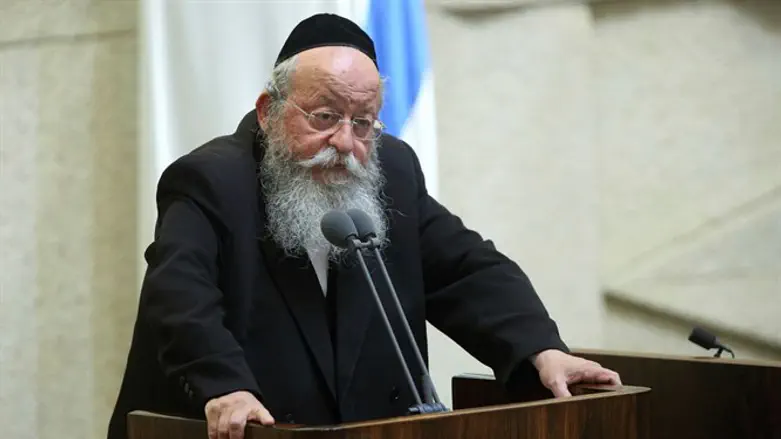
MK Menachem Eliezer Moses, chairman of the United Torah Judaism Parliamentary Group, said on Sunday that the haredi UTJ is not expected to quit the coalition after the new draft bill is approved by the Knesset in its first reading.
"Tomorrow a new committee will be formed in which [UTJ MK] Uri Maklev will likely be a member. The law will be approved in its first reading and that's fine. By the time it reaches its third reading it will either be corrected or it will not pass,” Moses told the haredi radio station Kol Barama.
The meaning of Moses’ comments is that UTJ does not intend to create a coalition crisis over the draft law despite being expected to oppose it in its first reading, on the assumption that the bill will undergo changes supervised by the haredi leadership ahead of its second and third readings.
Prime Minister Binyamin Netanyahu announced earlier on Sunday that the new draft law, aimed at settling the status of yeshiva students and their deferments from army service, will be brought to the Knesset for a vote next week, even before a final version of the bill has been agreed upon by coalition members.
Netanyahu also hinted that quiet agreements had been reached with the haredi parties, saying that after the first reading of the bill, there would be discussions among all the members of the coalition in order to reach a broad consensus for the second and third readings.
After the meeting of the coalition leaders, Shas chairman and Interior Minister Aryeh Deri clarified to Netanyahu that Shas opposes the draft law in its present form and will vote against it in the Knesset plenum.
"At the meeting of the heads of the coalition factions that took place today, I informed the prime minister that, according to a directive by the Council of Torah Sages, Shas opposes the draft law in its present form and will vote against it in the Knesset plenum," said Deri.
"As we made clear upon receipt of the memorandum of law, we view Torah study as a supreme value for the Jewish people and we will insist that every Torah scholar will be allowed to diligently study without interruption. We will not allow any harm to those who study Torah or the status of yeshiva students," added the Shas chairman.
For years, the Israeli government has struggled to resolve the issue of army deferments granted to full-time yeshiva students. Following rulings by the Supreme Court in the 1990s, the government formed the Tal Committee, which ultimately produced the Tal Law, approved by the Knesset in 2002.
The law aimed at resolving the legal issues cited by the Supreme Court, which ruled that the renewable, open-ended draft deferments for yeshiva students constituted discrimination. The Tal Law, originally intended to last five years, included measures encouraging haredi men to enlist in the army or join the job market, without curtailing the deferment program.
The law was struck down by the Supreme Court in 2012, after the Knesset renewed it in 2007.
In 2014, the Knesset approved a modified draft law, imposing limits on the number of deferments issued, capping the system for the first time since the 1970s.
A year later, the new coalition government stripped the draft law of most of the limitations imposed in the 2014 version. In 2017, however, the Supreme Court struck down the 2015 amendments, giving the government one year to pass a replacement.
This March, haredi coalition members pressured the government to pass a proposal which would circumvent the Supreme Court, enabling the 2015 amendments to be retained despite the court’s ruling. Opposition from Defense Minister Avigdor Liberman’s Yisrael Beytenu party, however, torpedoed the effort.
Now, a plan being advanced by Liberman would largely retain the deferments program, while increasing punishments for draft dodgers, benefits for draftees, and imposing economic sanctions on yeshivas whose student bodies do not meet induction goals set by the government.